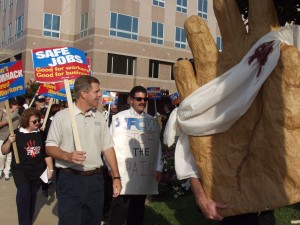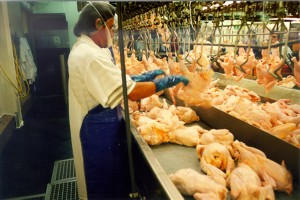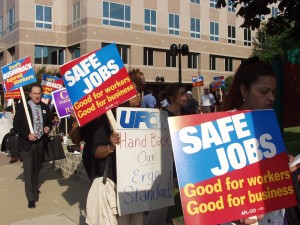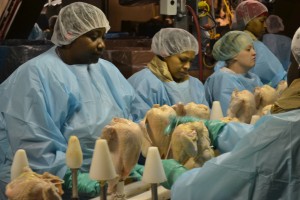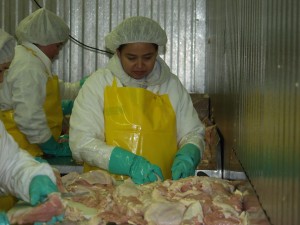 WASHINGTON, DC—A new study released by the National Institute for Occupational Safety and Health (NIOSH) confirms what workers in the poultry industry have been saying for decades—it is among the most dangerous places to work in America.
WASHINGTON, DC—A new study released by the National Institute for Occupational Safety and Health (NIOSH) confirms what workers in the poultry industry have been saying for decades—it is among the most dangerous places to work in America.
Among the key findings of the report:
- 42 percent of workers had evidence of carpal tunnel syndrome
- 41 percent of workers performed daily tasks above the threshold recommended by industry experts
- 57 percent of workers reported at least one musculoskeletal symptom
The report was commissioned to allay safety concerns about the United States Department of Agriculture’s (USDA) proposed poultry modernization rule, which would increase the speed that birds are processed from 70-91 a minute to a maximum of 175 a minute. Yet the drastic level of injury documented by NIOSH occurred before lines were ever speeded up.
“One injury is one too many,” said UFCW International President Joe Hansen. “Four out of ten workers with carpal tunnel. Nearly six out of ten showing symptoms. This is an epidemic.”
Hansen said the industry, which has fought efforts to give workers a union voice on the job, should stop dragging its feet and adopt the recommendations outlined in the NIOSH report. They include but are not limited to: designing job tasks at the levels recommended by industry experts, providing more than one break during a work shift, and enhancing reporting, screening, and assessment of musculoskeletal disorders.
Hansen called the idea of proceeding with the poultry modernization rule “reckless” given the current rash of injuries across the industry. “The USDA must pull this rule and take a hard look at how to improve safety in our nation’s poultry plants,” he said. “This NIOSH report is both a wakeup call and a warning sign.”
By increasing line speed so dramatically, workers will be at heightened risk of repetitive motion related injuries. Despite this fact, the Occupational Safety and Health Administration (OSHA) has yet to develop a standard that would adequately protect workers.
Hansen said the rule should be scrapped until poultry workers can be guaranteed a safe work environment.
###
The United Food and Commercial Workers International Union (UFCW) represents more than 1.3 million workers, primarily in the retail and meatpacking, food processing and poultry industries. For more information about the UFCW’s effort to protect workers’ rights and strengthen America’s middle class, visit www.ufcw.org, or join our online community at www.facebook.com/UFCWinternational and www.twitter.com/ufcw.

